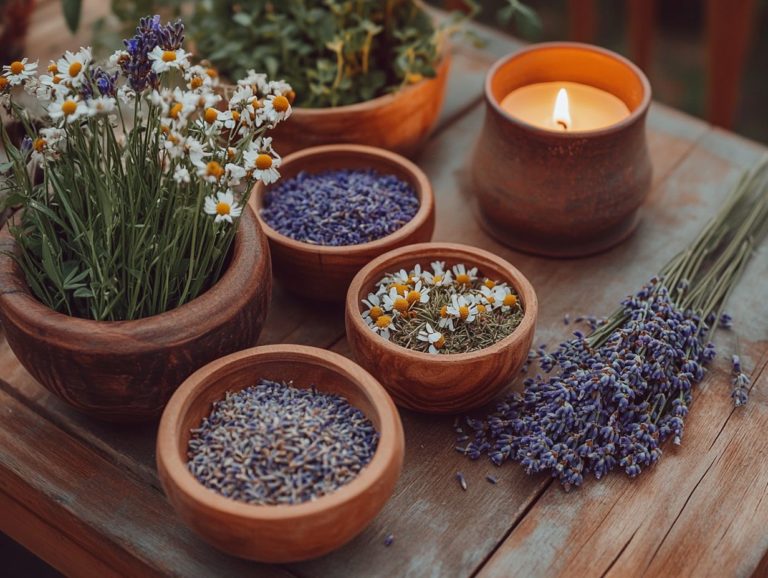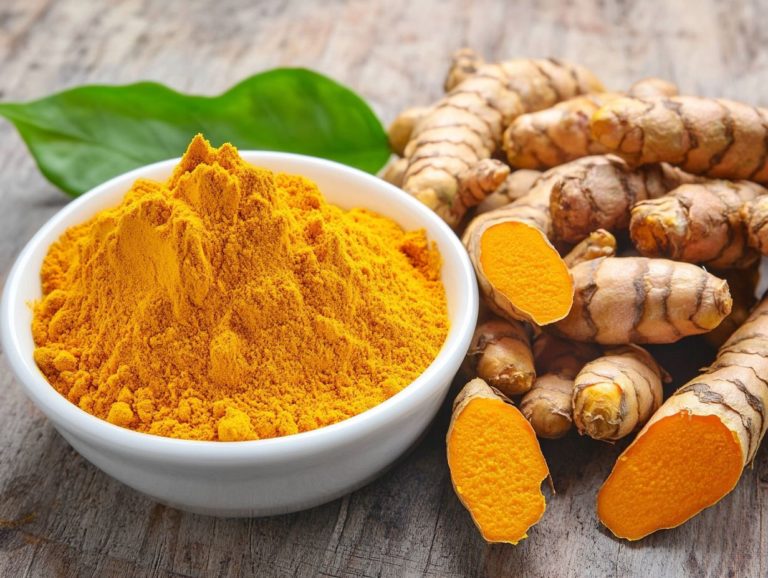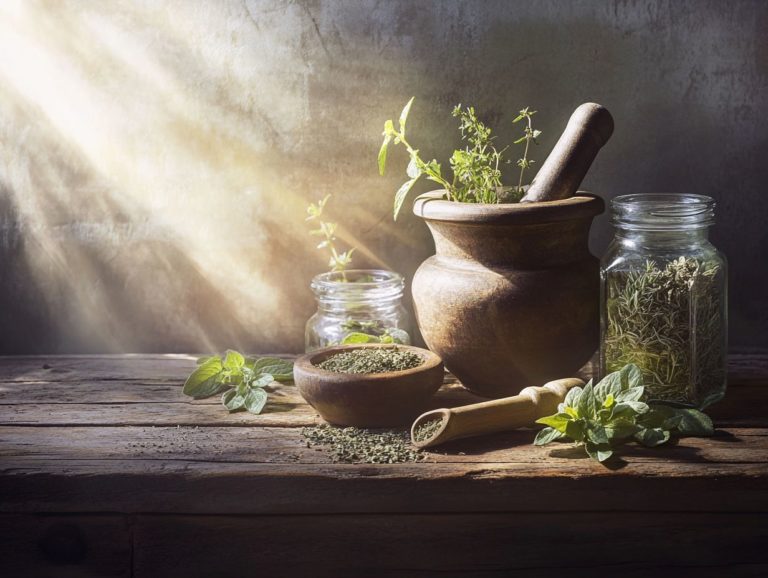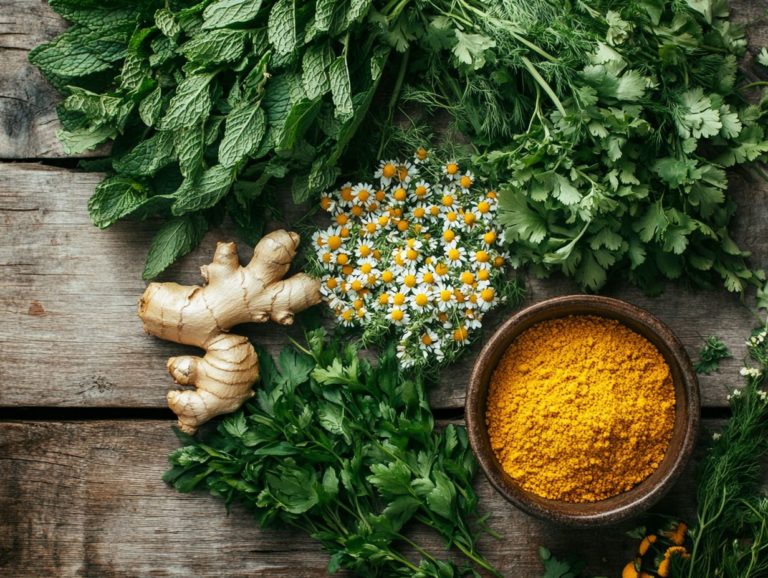Healing Properties of Aloe Vera
Aloe vera, often hailed as the plant of immortality, has enchanted cultures for centuries with its remarkable healing properties and nutritional benefits.
With roots deeply embedded in traditional remedies and a wide array of modern applications in skincare and digestive health, this succulent presents a treasure trove of knowledge just waiting for you to explore.
Get ready to explore the rich history and cultural significance of Aloe vera! Dive into its impressive nutritional profile and unveil effective methods to harness its healing powers all while considering important safety guidelines.
Don t miss out on discovering how this extraordinary plant can elevate your well-being!
Contents
Key Takeaways:
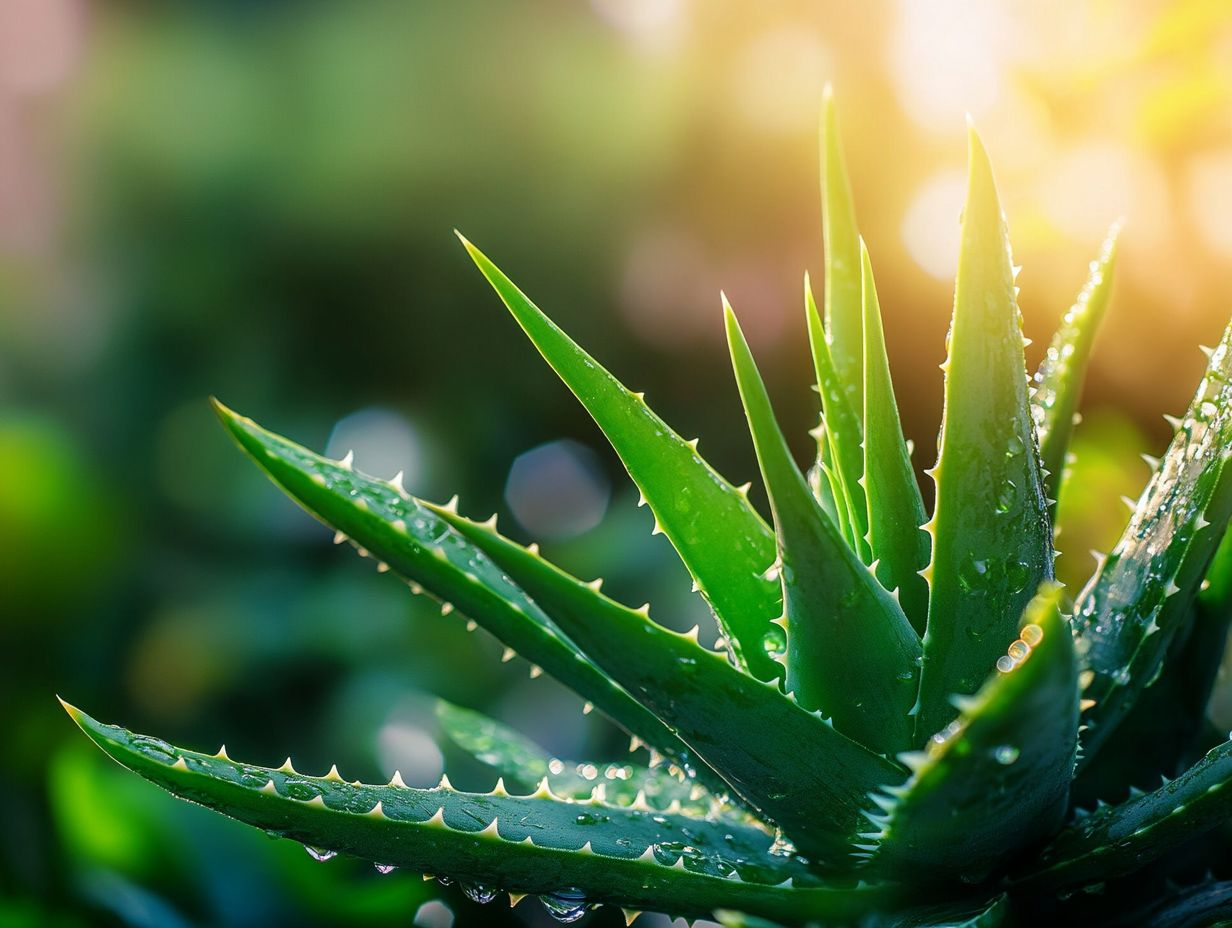
- Aloe vera has been used for centuries in traditional medicine due to its healing properties for skin and digestive health.
- It is a nutritional powerhouse, containing key nutrients that provide various health benefits such as promoting wound healing and aiding in digestion.
- When using Aloe vera for healing, it is important to consider the different forms and methods of application, as well as potential risks and precautions.
What is Aloe Vera?
Aloe vera, scientifically known as Aloe barbadensis, is a distinguished medicinal plant celebrated for its remarkable healing properties, particularly as a natural remedy for various skin conditions and digestive issues.
This succulent grows in places like California and the Caribbean. Its active ingredients have been valued in traditional medicine for centuries, making it a staple in home remedies and modern herbal supplements.
Its gel-like sap is a treasure trove of vitamins, minerals, enzymes, and amino acids, all contributing to its impressive healing benefits. Cultivating Aloe vera is easy; it thrives in arid environments, which is why places like New Mexico are ideal for its growth. Both farmers and home gardeners appreciate its resilience and low watering requirements.
Rich in antioxidants and endowed with anti-inflammatory properties, Aloe vera is your go-to for soothing sunburn, hydrating the skin, and facilitating healing from minor cuts. As the appreciation for natural remedies continues to rise, Aloe vera is a valuable asset in any herbal medicine cabinet, revered for its capacity to enhance overall well-being.
History and Cultural Significance
The history of Aloe vera is a fascinating tapestry woven through ancient civilizations, particularly in Egypt, where it held a place of honor among figures like Cleopatra and Nefertiti. They cherished its remarkable healing properties and skin benefits, elevating this medicinal plant to a status that transcended mere herbal supplement.
Throughout the ages, Aloe vera has not only been recognized for its therapeutic qualities but has also emerged as a timeless symbol of health and beauty across diverse cultures.
Traditional Uses and Beliefs
Historically, Aloe vera has served as a time-honored home remedy for a range of ailments, particularly skin conditions. Its gel is often applied to minor burns, acne, and various irritations to speed up the healing process.
This remarkable plant has roots in ancient civilizations, where it enjoyed a revered status in traditional medicine and folklore. For example, Aloe vera was dubbed the plant of immortality and was a go-to for Cleopatra, who used it to enhance her beauty. This highlights its long-standing connection to skin health.
Across cultures, many share stories of Aloe vera’s miraculous soothing properties, believing it not only eases physical discomfort but also offers spiritual protection. Even today, its versatile gel remains a staple in households worldwide, symbolizing a seamless blend of ancient wisdom and modern home remedies. It appeals to those seeking natural alternatives for skin issues.
Nutritional Profile of Aloe Vera
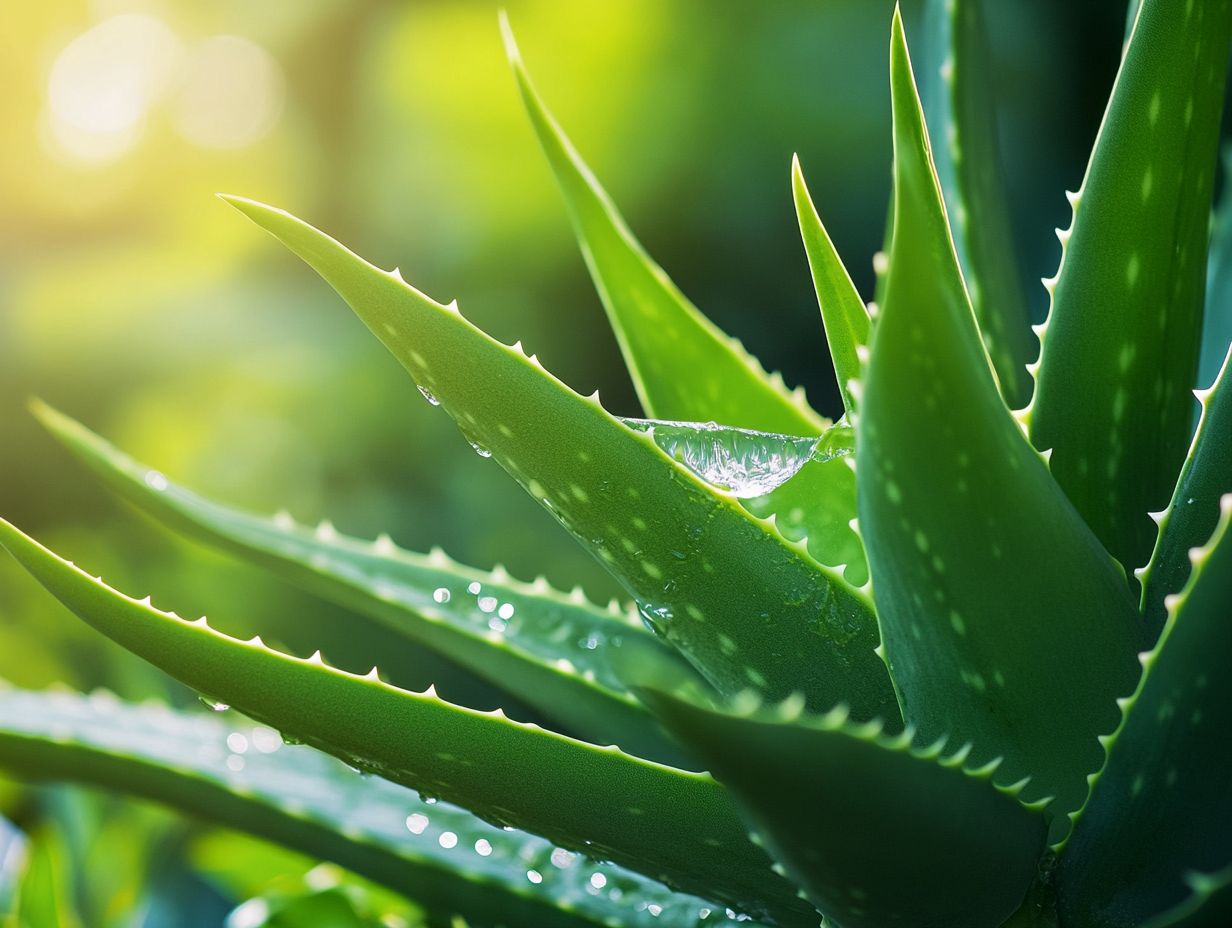
Aloe vera showcases a rich array of nutrients that enhance its medicinal properties. It is packed with essential vitamins, minerals, and amino acids vital for overall health and wellness.
This remarkable plant is abundant in antioxidants and is recognized for its potential benefits in promoting skin integrity and supporting digestive health. Start using Aloe vera today to boost your skin health and overall wellness!
Key Nutrients and Their Benefits
Aloe vera is a treasure trove of essential vitamins, minerals, and antioxidants, positioning it as a nutritional powerhouse that offers healing benefits, from skin rejuvenation to anti-inflammatory effects.
Rich in Vitamin C, Aloe vera is essential for collagen synthesis, which helps skin remain elastic and aids in wound healing. Vitamin E acts as a potent antioxidant, protecting your cells from oxidative stress and enhancing overall skin health.
The interplay between these vitamins not only reduces inflammation but also strengthens your skin’s natural barrier, offering lasting protection and hydration. Additionally, Aloe vera is rich in minerals like zinc and magnesium, which amplify its reparative qualities and make it an all-encompassing solution for various skin concerns.
Healing Properties of Aloe Vera
The healing properties of Aloe vera extend beyond simple skin applications. Research suggests that it can aid in wound healing, bolster skin integrity, and offer relief for digestive issues such as inflammatory bowel syndrome and heartburn.
Embracing Aloe vera could enhance your skin health and overall well-being.
Effective Uses for Skin and Digestive Health
Aloe vera stands out as a powerhouse for both skin and digestive health, offering significant benefits including treating acne, soothing minor burns, and promoting the healing of chronic wounds.
The gel extracted from its leaves is packed with potent anti-inflammatory and antimicrobial properties, making it a go-to for anyone dealing with acne. Many users have noted a remarkable decrease in redness and irritation with regular use, highlighting its effectiveness.
But Aloe vera doesn t stop at the skin; it can also be consumed in juice form to ease gastrointestinal discomfort, including inflammation and irritable bowel syndrome. Testimonials reveal that individuals experience improved digestion and reduced bloating after incorporating Aloe vera into their daily regimen.
Its versatility and gentle nature, whether applied topically or ingested, position Aloe vera as a cornerstone in holistic health practices.
How to Use Aloe Vera for Healing
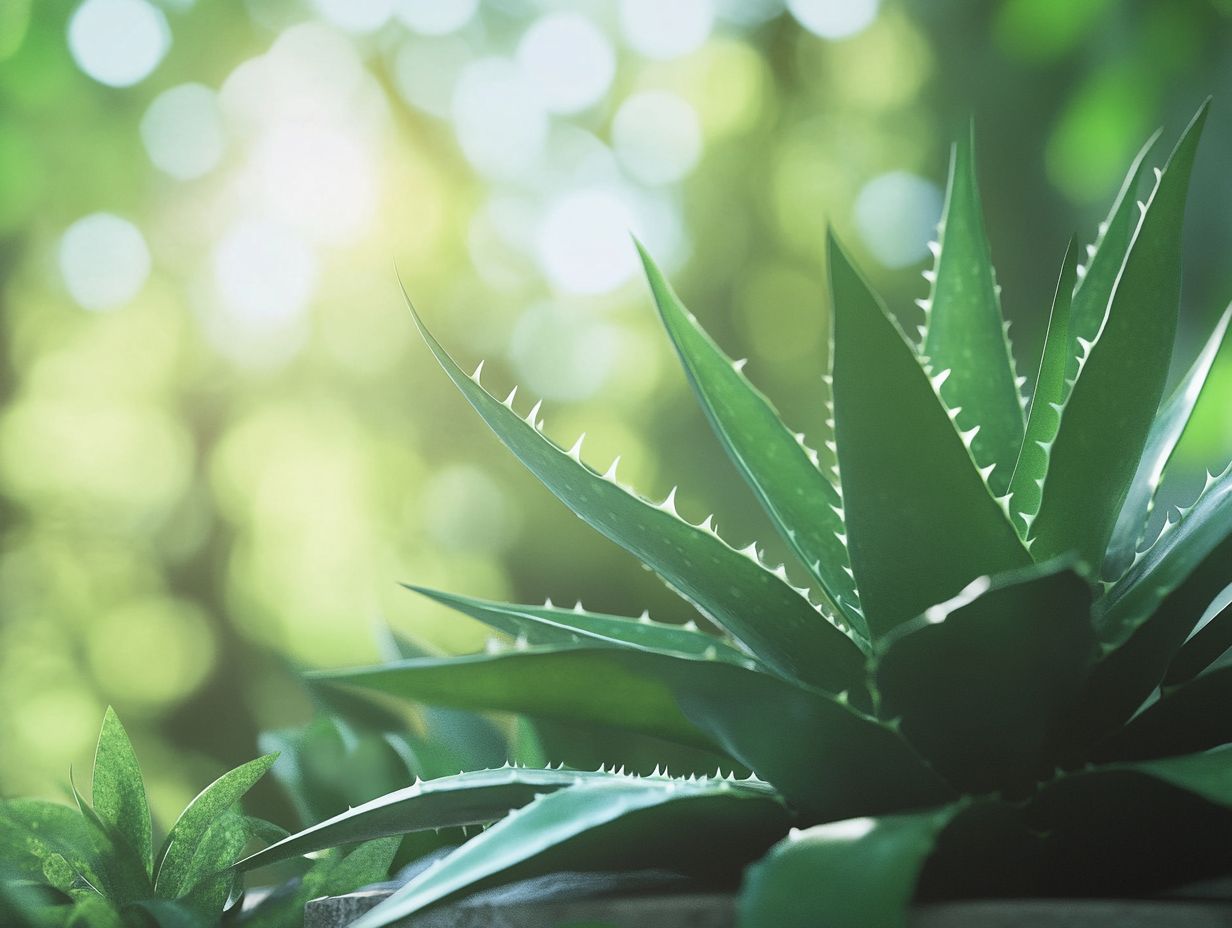
Harness the healing power of Aloe vera through various methods of application. For skin conditions, apply aloe gel directly to the affected area and massage gently to soothe and revitalize.
For digestive benefits, explore the ingestion of aloe latex. Aloe latex is a yellowish substance that can act as a natural laxative, though caution is advised due to potential side effects.
Different Forms and Methods of Application
There are several forms of Aloe vera, including aloe gel and aloe latex, each with unique properties for various home remedies and health issues. Understanding these distinctions enhances your ability to harness the full potential of this versatile plant.
Aloe gel, extracted from the inner leaf, is celebrated for its soothing and hydrating qualities, making it perfect for topical use on sunburns, cuts, and irritated skin. In contrast, aloe latex, derived from the yellowish sap just beneath the leaf’s skin, contains compounds that may function as a natural laxative.
Both forms offer specific advantages, but it’s crucial to know how to prepare and apply them safely to maximize their therapeutic benefits.
Safety and Side Effects of Aloe Vera
Aloe vera is often praised for its safety across various applications. However, it’s crucial to understand its potential side effects and safety precautions. This is especially important when using it in high concentrations or taking it by mouth, as advised by the FDA.
Potential Risks and Precautions
There are risks associated with using Aloe vera, particularly concerning its component aloin. Consuming high doses without proper guidance can lead to digestive issues.
Aloe vera is known for its healing properties. It’s essential to know that excessive intake can trigger symptoms like abdominal cramps, diarrhea, and even electrolyte imbalances. Always stick to recommended dosages, and consult healthcare professionals, especially if you are pregnant, nursing, or have pre-existing health conditions.
If you have liver disease or are taking certain medications, avoid Aloe vera products. Interactions may worsen your condition or reduce the effectiveness of your prescribed treatments. Knowledge and careful consideration are essential for ensuring safe usage.
Watch this video to learn more about the benefits and risks of Aloe Vera.
Frequently Asked Questions
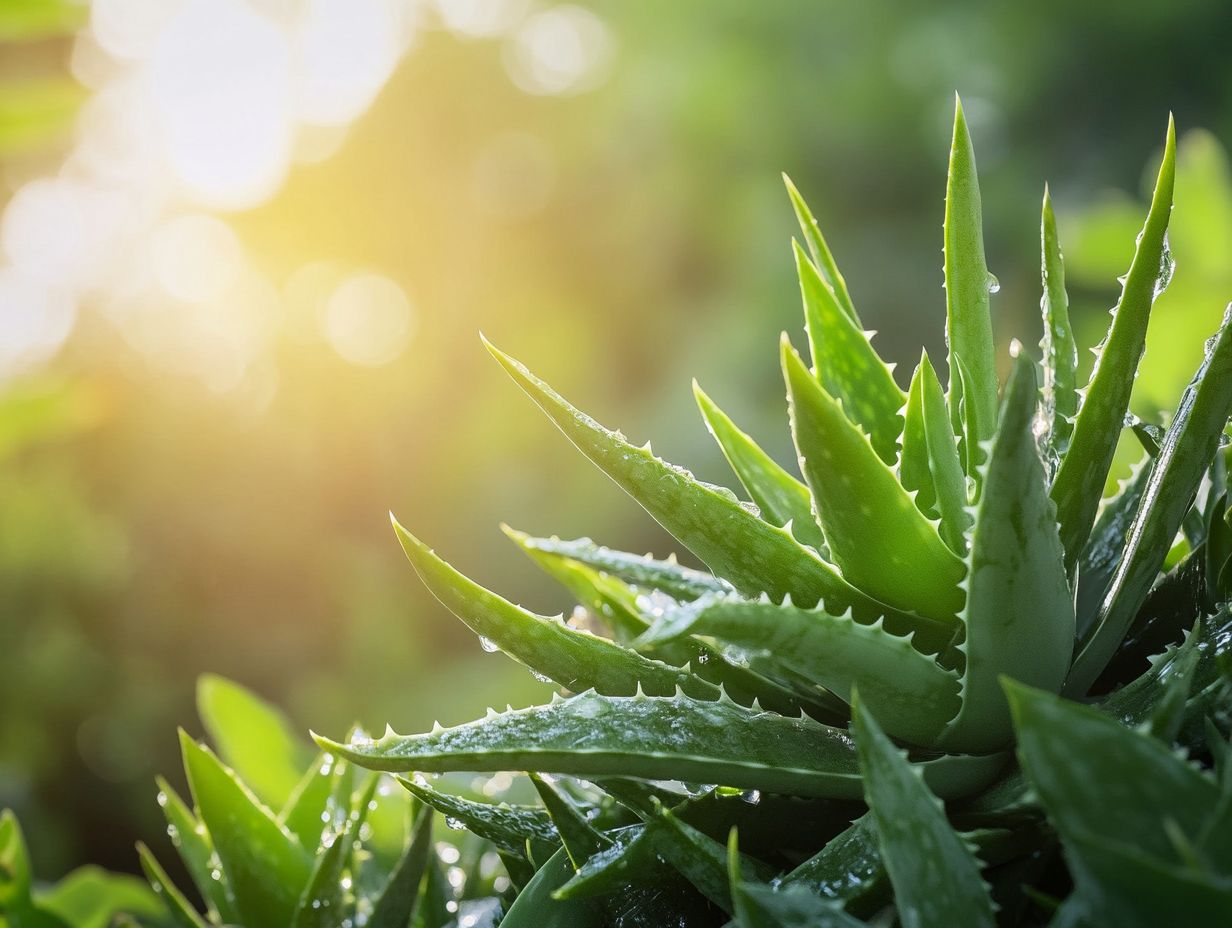
What are the healing properties of Aloe Vera?
Aloe Vera has various healing properties, including anti-inflammatory, antibacterial, and antiseptic benefits. It also contains vitamins, minerals, and enzymes that promote skin healing.
How does Aloe Vera help in healing wounds?
Aloe Vera has a cooling effect on the skin, which helps reduce inflammation and aids in wound healing. It also contains hormones that stimulate the growth of new skin cells and reduce scarring.
Can Aloe Vera be used for sunburn relief?
Yes, Aloe Vera is an excellent natural remedy for sunburn. Its anti-inflammatory properties soothe the skin and reduce pain and redness. It also provides a protective layer, aiding in healing.
Is Aloe Vera effective in treating acne?
Aloe Vera has antimicrobial properties that can help prevent acne-causing bacteria. It also contains salicylic acid, a common ingredient in acne-fighting products, and can reduce inflammation and redness associated with acne.
Does Aloe Vera have any healing benefits for the digestive system?
Yes, Aloe Vera has been used for its healing benefits for the digestive system. It can relieve symptoms of digestive disorders such as acid reflux, irritable bowel syndrome, and ulcers. Aloe Vera also aids digestion and promotes healthy bowel movements.
How can Aloe Vera be used for hair and scalp health?
Aloe Vera has moisturizing and conditioning properties that promote healthy hair and scalp. It can help with dandruff, dry scalp, and hair loss. You can use Aloe Vera gel or juice as a hair mask or add it to your shampoo for added benefits.
For personalized advice and to explore more about Aloe Vera, don’t hesitate to consult a healthcare professional!

